New playoff chairman Kirby Hocutt discusses rankings criteria, more

For the first time in the College Football Playoff era, a new chairman will lead the selection committee. On Jan. 14 the playoff announced Texas Tech athletic director Kirby Hocutt would serve as chairman of the committee for the 2016 season. Hocutt takes over for Arkansas athletic director Jeff Long, who rotates out of the role after two seasons.
SI.com caught up with Hocutt to discuss his new role, being the public face of the playoff, selection criteria, the Big 12’s stability and much more.
Zac Ellis: How did the process unfold that ultimately led to you being named chairmen of the selection committee?
Oklahoma, Alabama lead 2016 Way-Too-Early College Football Top 25
Kirby Hocutt: Well, first of all, I am excited about serving as the chairman of the College Football Playoff selection committee. It is an honor to do so. I’m flattered that the management committee asked me to serve in this role. It’s a big job. And it’s one I obviously look forward to. I thoroughly enjoyed my first year on the selection committee—the people, the process and the opportunity to give back to the game of college football that has been so important to my life, and continues to be.
So Bill Hancock called me the afternoon of this year’s national championship game on Jan. 11. We were in Phoenix. I believe he called around 1:30 or 2 o’clock that afternoon, and he said the management committee had met and had endorsed my candidacy to serve in this role. He asked, would I be willing to do it? Diane, my wife, was with me, so I had a chance to visit with her about the opportunity. And then I said, absolutely. It then expedited pretty quickly from that point forward to the announcement last Thursday.
ZE: Jeff Long served as chairman for the first two seasons of the playoff. Has he offered any advice about taking on the role?
KH: Jeff is probably one of my closest counterparts in this profession. Jeff and I worked together at the University of Oklahoma, and he’s become a dear friend, somebody I talk to on a consistent basis. I have a great admiration for Jeff, and I don’t think there’s anybody that could’ve done a better job serving in this role the first two years of the playoff process.
After I accepted the new role, Jeff came up, congratulated me and gave me a hug that night at the championship game. But he and I haven’t had a chance to talk in great detail since then. Obviously watching him for two years, I thought he did a tremendous job, and I know he will continue to be a resource for me as I transition into this job.
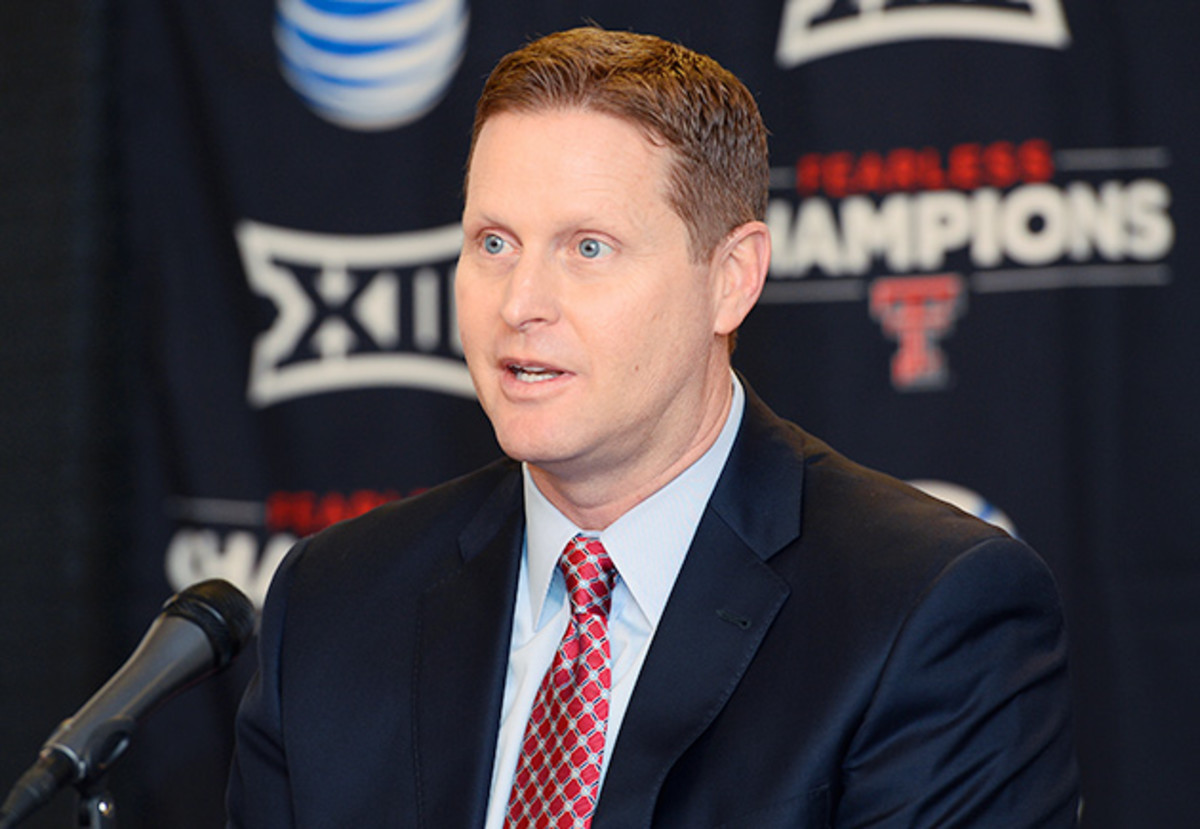
ZE: Fair or not, Long dealt with a lot of criticism as the public face of the selection committee. Now it’s your job to face ESPN’s cameras for six straight weeks. How much did that weigh on your decision to accept the role?
KH: The way I look at that is, this is college football. I believe it’s the greatest game in our country. And I believe that the passion our society and our fan bases have for the game, that commitment that everybody shares with the sport, makes this a great opportunity to be involved and engaged in this role. I played college football for five years, and when you’re a part of the Bill Snyder system, when you play defense for five years under Bob Stoops and Jim Leavitt as co-defensive coordinators, you develop some pretty thick skin. So I’m passionate about the game, and I look forward to serving in this chair position. I won’t take criticism personally. I know people love the game and are passionate about it, and that’s a great thing.
ZE: You were able to watch the first year of the playoff as an athletic director in 2014 before serving on the selection committee in 2015. After watching from afar, what did you learn about the playoff process once you participated in it last season?
2015 season in review: Handing out awards for players, teams and more
KH: Watching it unfold from afar, it was really fascinating how the semifinals captivated the entire country, and the added attention and focus that it brought to the regular season, which I think is one of the best regular seasons in all sports in our country. But what a tremendous success it was in year one. And then having the opportunity to sit in the room and be a part of the process and the rankings every week in year two, I just gained so much appreciation for the committee and the protocol and how the commissioners and the management council committee have put the process together. It’s obviously shown that it works. It works in identifying the best teams in college football. I’m so appreciative of the committee members, the professional demeanor, the preparation and unique perspective everybody brings to the table.
ZE: Speaking of perspective, you are one of the youngest members of the committee at 44 years old. What have you learned from committee members who have been around the game longer?
KH: That’s the thing that you enjoy so much. You’re spending six or seven weeks together as a group, and in the amount of time you spend together, you get to know the committee members. You just value the relationships. I value so much the perspective and the experiences everybody in that room has had in college football. Having the opportunity to sit and talk with some of the greatest coaches ever to be in the game, what an awesome opportunity that is each and every week. Just gained so much appreciation for everybody’s perspective and what they hold important in ranking the top 25 teams in the country.
ZE: In your opinion, how important is it to have coaches in the room to help evaluate teams?
KH: I personally place tremendous value in the coaches’ voice and what they bring to the table. I think that’s extremely important for this committee to have some well-represented coaches voices around that table.
ZE: Most of us aren’t able to set foot in that room while the committee evaluates teams. What don’t we know about the process?
KH: There’s a lot that’s been written about, with the process and the protocol. I just appreciate everybody’s effort to stay consistent to what the purpose of the selection committee is. I personally believe the protocol that’s been set up works quite well.
ZE: That official Selection Committee Protocol lists a handful of key criteria used to evaluate teams. Did any one criteria stand out more than others during your first year on the committee?
Ranking the 25 Best Games of the 2015 College Football Season
1. Alabama 45, Clemson 40
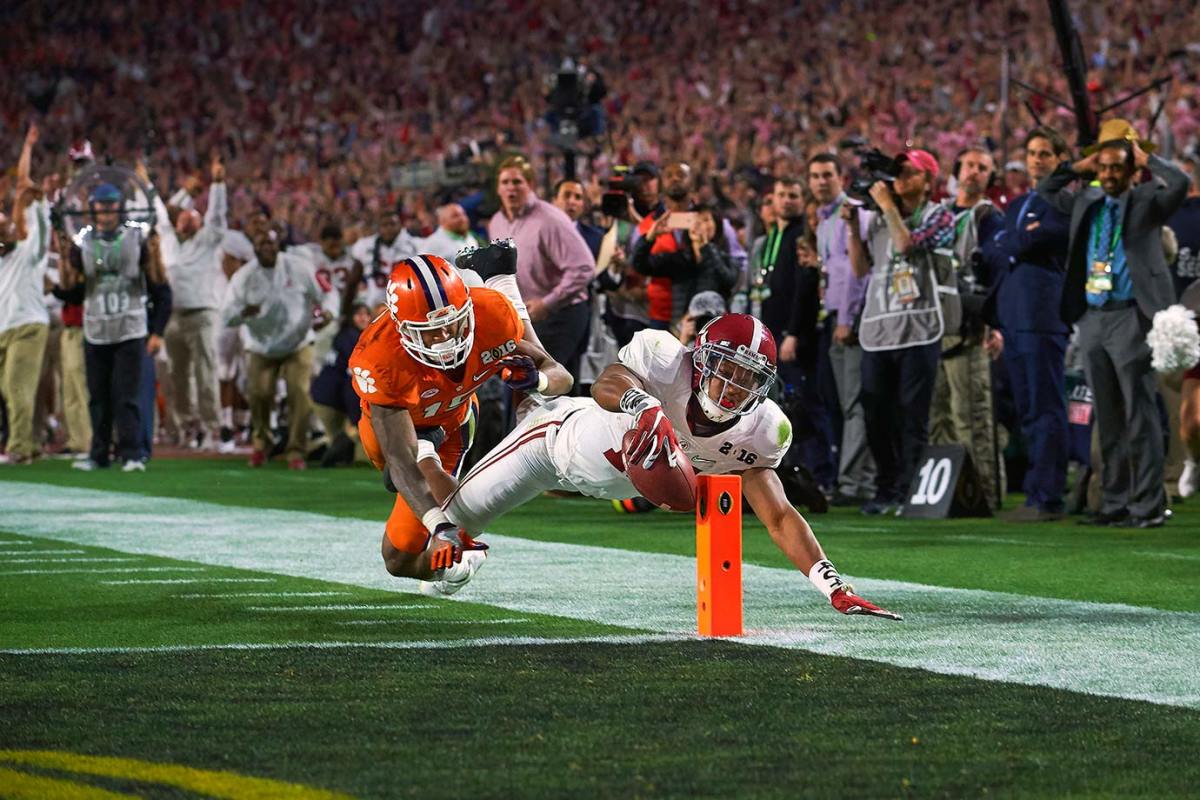
A pair of Heisman Trophy finalists. A 37-point fourth quarter. One of the greatest onside kicks in college football history. Oh, and did we mention this matchup determined the national championship? Alabama’s epic title victory over Clemson evolved into an instant classic, one that saved us from a postseason defined by lifeless blowouts.
2. Michigan State 27, Michigan 23
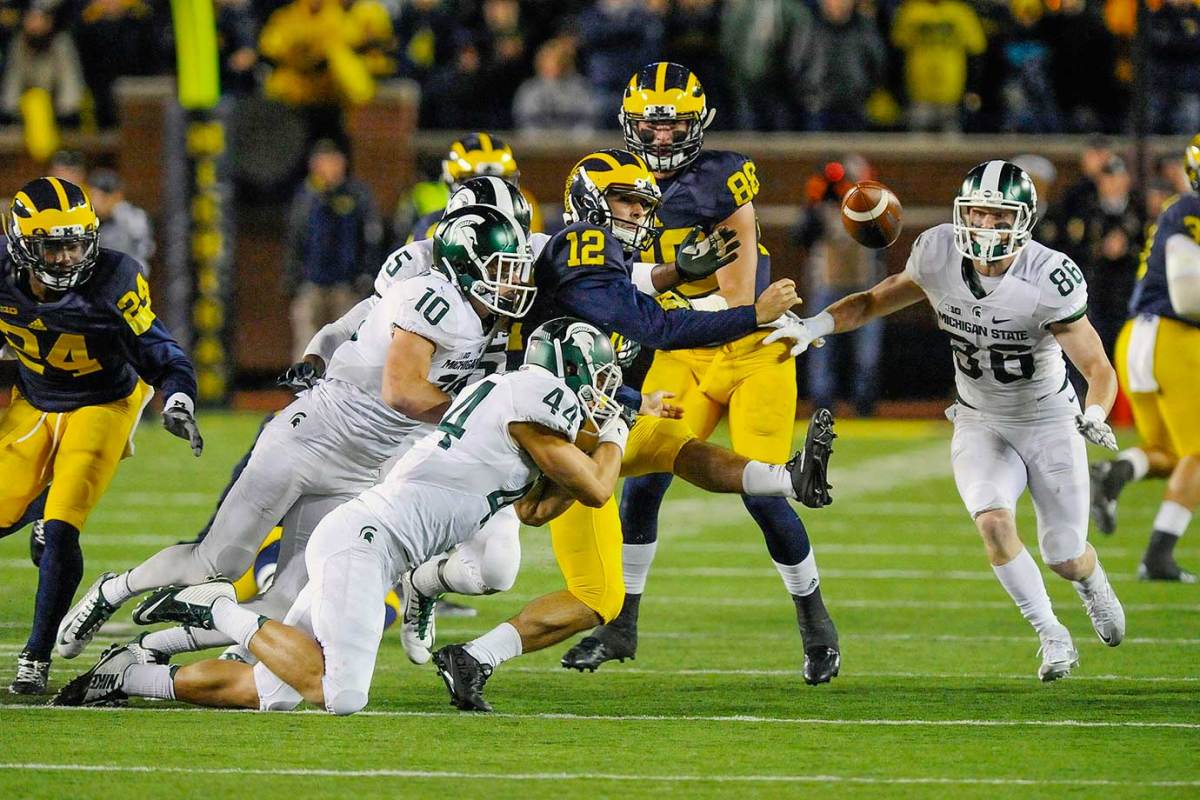
Hope. Horror. Heartbreak. Those three words sum up one of the craziest endings of the 2015 season. Up 23–21 with 10 seconds to go—and after leading the Spartans all game—Michigan chose to punt on 4th-and-short. But the Wolverines botched the kick, and the Spartans’ Jalen Watts-Jackson scooped up the loose ball and raced to the end zone for the winning score.
3. Stanford 38, Notre Dame 36
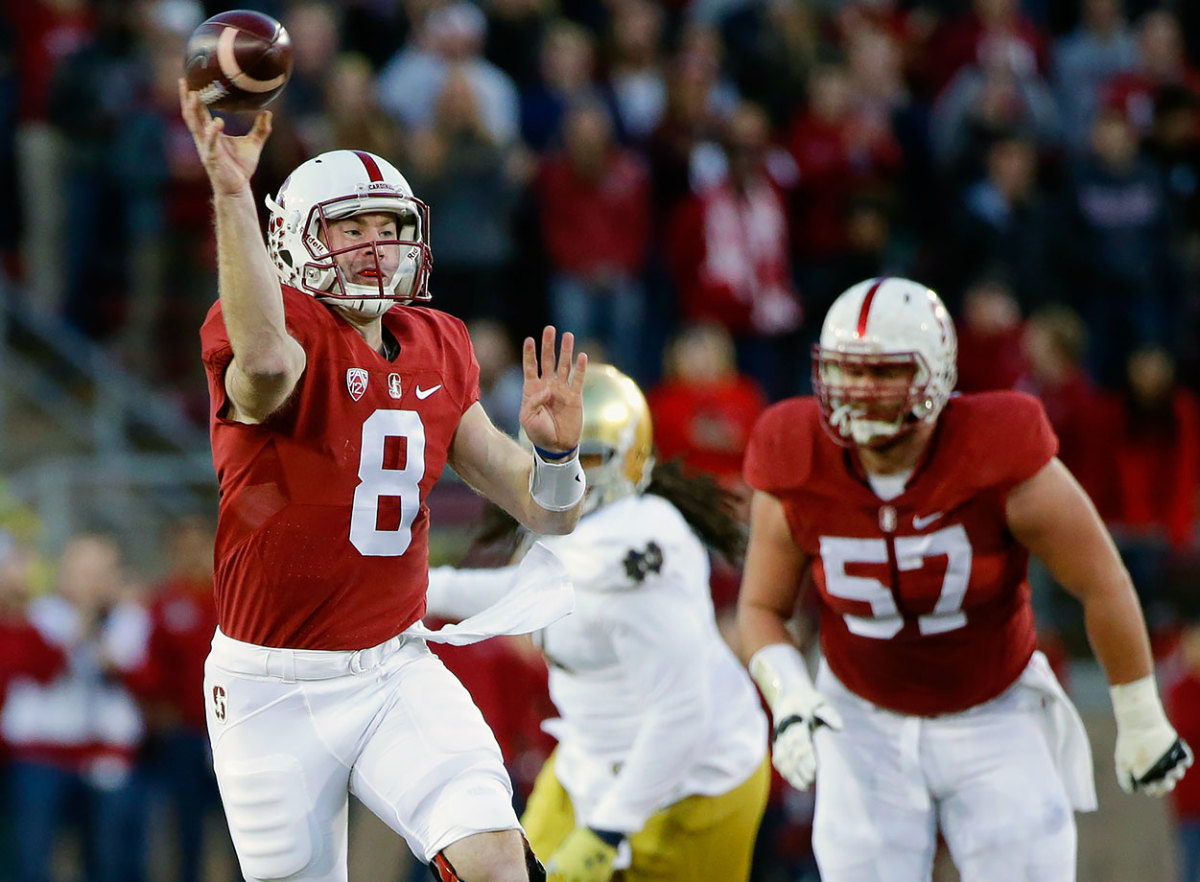
How exciting was this matchup? Notre Dame scored touchdowns of 93, 73 and 62 yards, respectively, and took a one-point lead with 30 seconds remaining in the fourth quarter—and lost. Stanford kicker Conrad Ukropina drilled a 45-yard field goal as time expired to steal the win. It capped a magnificent effort from both sides, and one that had Ukropina mentioning fate. “We got the ball, drove down, and it was almost like it was meant to be,” he told reporters later. While there were plenty of stars on this night, none shined brighter than Cardinal quarterback Kevin Hogan. On Senior Day, he went 17 of 21 passing for 269 yards with four touchdowns and no interceptions—and tossed a 27-yard completion to receiver Devon Cajuste that set the stage for Ukropina’s heroics.
4. TCU 55, Texas Tech 52
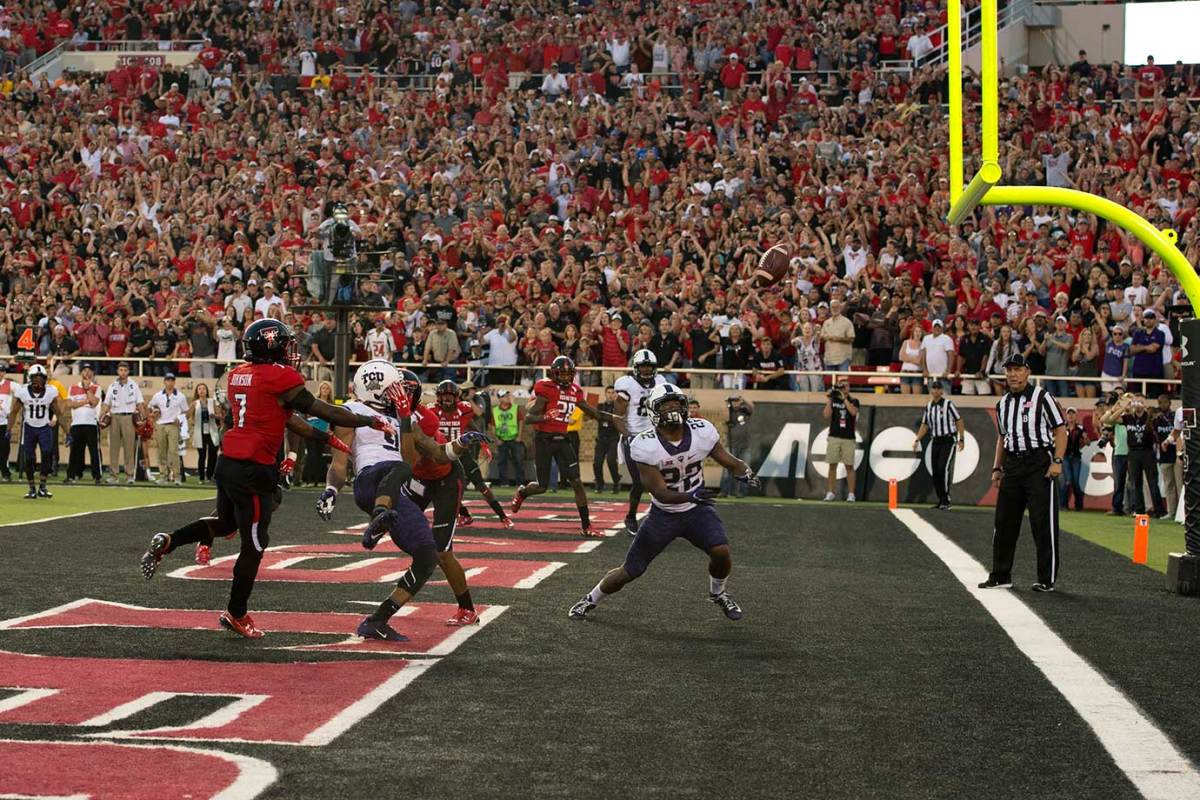
Injuries would eventually derail TCU’s campaign for the College Football Playoff, but the Horned Frogs looked doomed in an early-season game against Texas Tech… until a miracle struck. Down 52–48 in a rollicking affair that featured 1,357 total yards, TCU faced a fourth-and-goal at the five-yard-line. Quarterback Trevone Boykin appeared to overthrow Josh Doctson until running back Aaron Green sprinted behind Doctson, nabbed a deflection and got two feet inbounds to secure the touchdown, the win and—at that moment—TCU’s undefeated season.
5. Clemson 24, Notre Dame 22
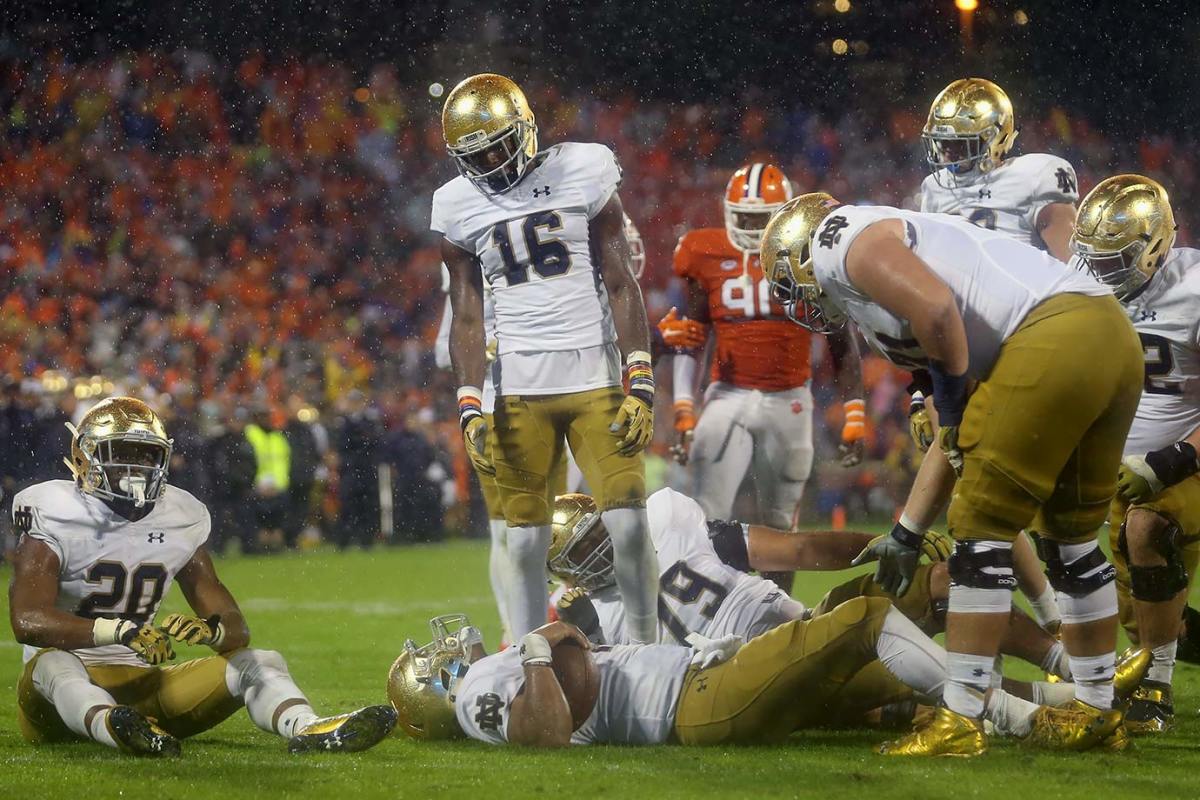
Clemson solidified its status as a playoff contender by surviving Notre Dame—and hurricane-like elements—in a soggy Death Valley. The Fighting Irish whittled the Tigers’ 17-point, fourth-quarter lead to two on a Deshone Kizer touchdown pass with seven seconds to play. But defensive tackle Carlos Watkins stuffed Kizer on Notre Dame’s two-point conversion attempt, maintaining Clemson’s unblemished record. As coach Dabo Swinney bellowed in his postgame interview, it was a “Bring your own guts” victory.
6. Michigan State 17, Ohio State 14
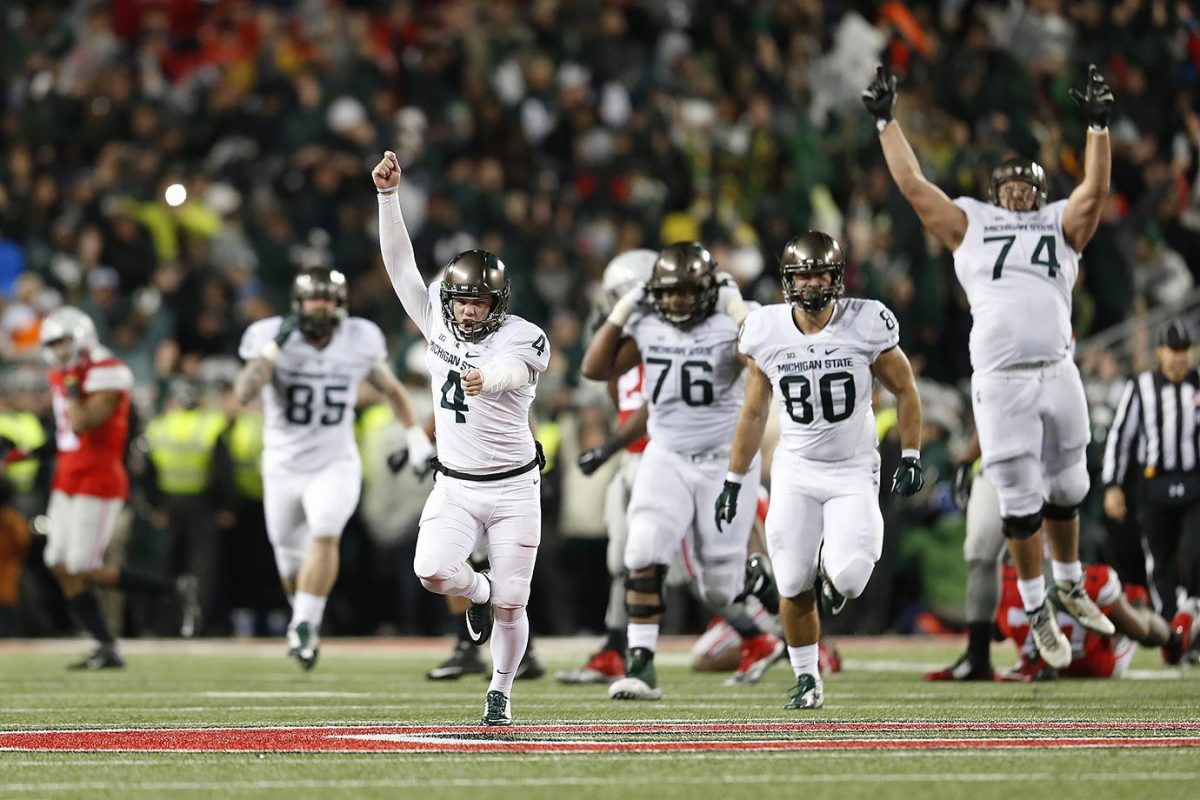
The Spartans, playing without an injured Connor Cook, came into Columbus and took down the undefeated Buckeyes on a 41-yard field goal from Michael Geiger as time expired to end Ohio State’s 23-game winning streak. (Geiger’s boot and windmill celebration made him a celebrity around East Lansing.) The win put Sparty in prime position to win the Big Ten East (which it later did), while essentially knocking the Buckeyes from College Football Playoff contention. Michigan State also shut down star running back Ezekiel Elliott, who rushed only 12 times for 33 yards and voiced his unrest afterward with Urban Meyer and the coaching staff’s game plan.
7. TCU 47, Oregon 41 (3OT)
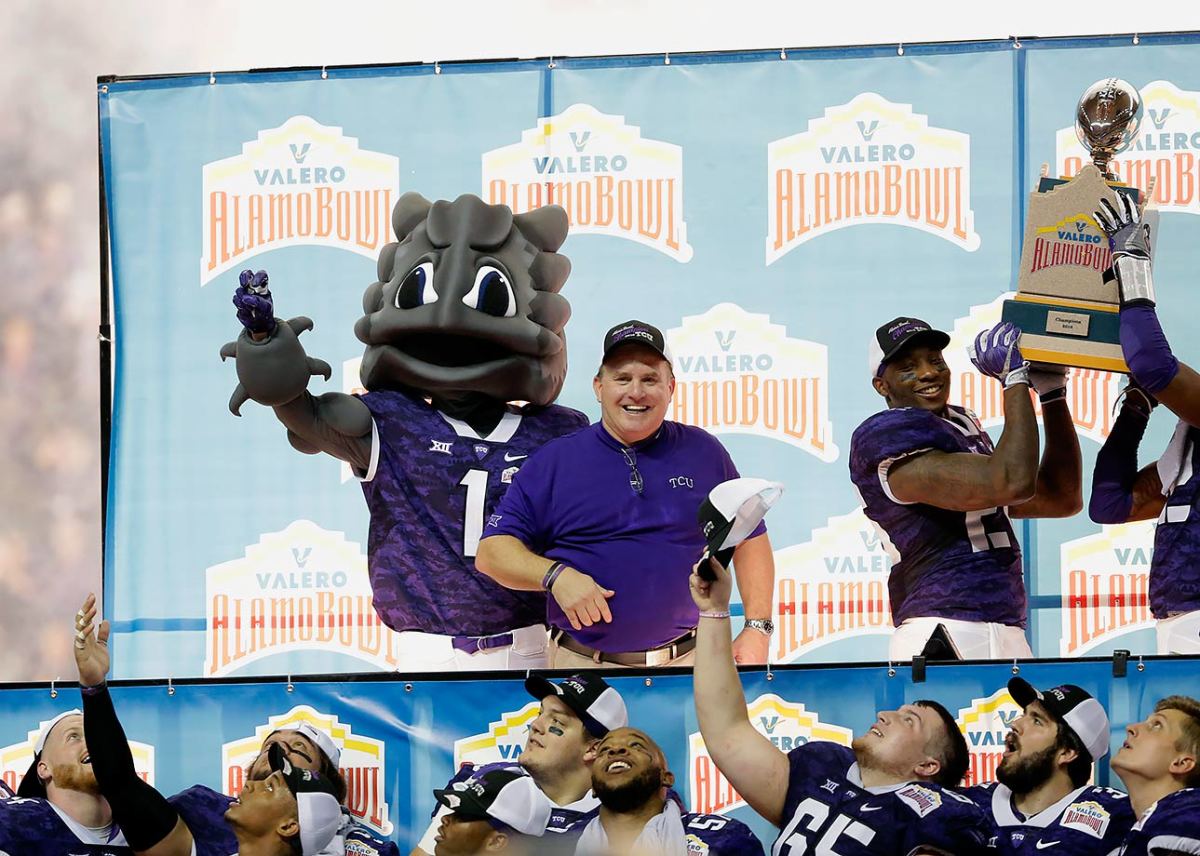
The Alamo Bowl appeared destined to be another postseason blowout, with Oregon leading TCU 31–0 at the half. However, when Ducks quarterback Vernon Adams Jr. went out after a helmet-to-helmet hit, the Horned Frogs sprung to life. TCU ripped off 31 unanswered points in the second half—behind quarterback Bram Kohlhausen’s 396 total yards (351 passing, 45 rushing) and four touchdowns—before going on to win 47–41 in triple overtime. What sparked the incredible comeback? Well, Horned Frogs coach Gary Patterson changed from his black shirt into a purple shirt at halftime.
8. Arkansas 53, Ole Miss 52 (OT)
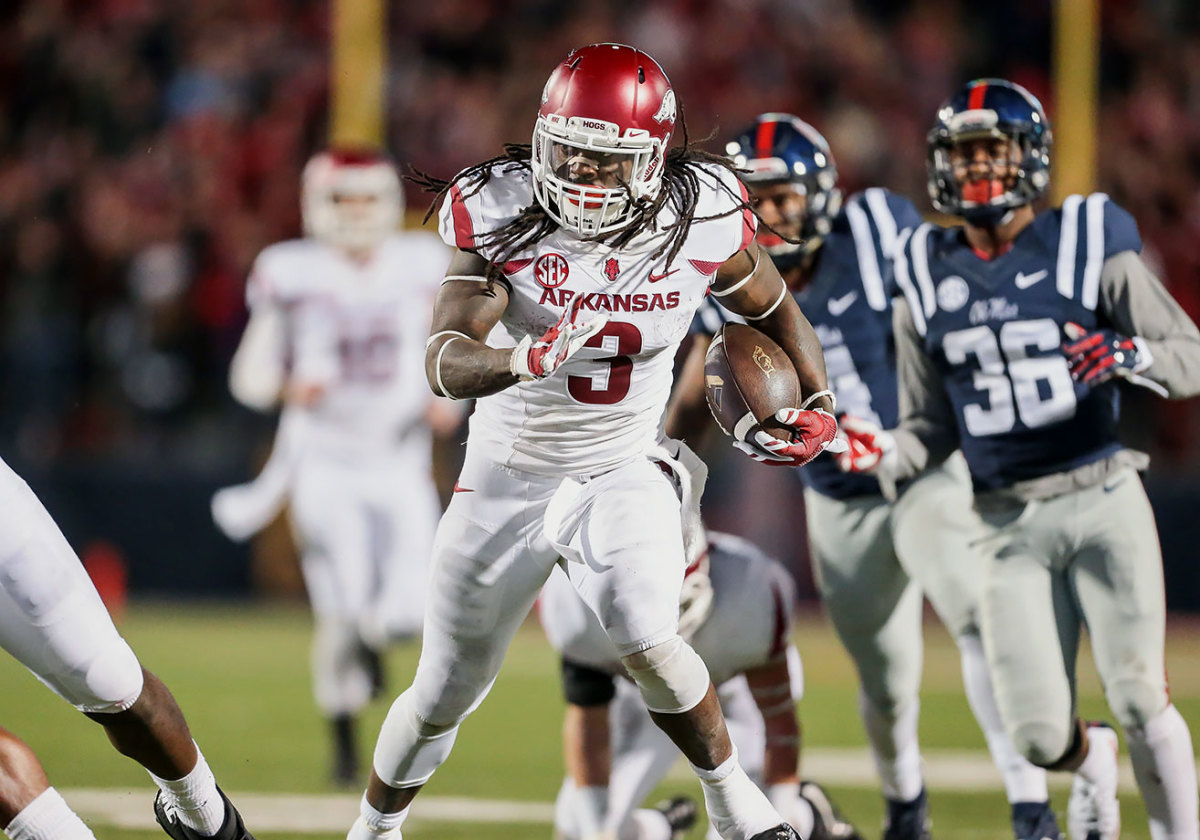
This game was ultimately more pivotal for Alabama than either the Razorbacks or Rebels because Ole Miss would have won the SEC West had it won this game, likely denying the Crimson Tide a spot in the playoff. As for the teams in this game, a thrilling shootout between Brandon Allen and Chad Kelly led to overtime, where Ole Miss seemed certain to win when the Rebels wrapped up Hunter Henry on fourth-and-25. However, Henry’s blind backwards toss found Alex Collins who scampered to move the chains. After Arkansas scored, Ole Miss appeared victorious again when it sacked Allen on a two-point conversion try. But a facemask penalty gave the Razorbacks another shot, and Allen reached the end zone this time on a QB keeper.
9. Ole Miss 43, Alabama 37
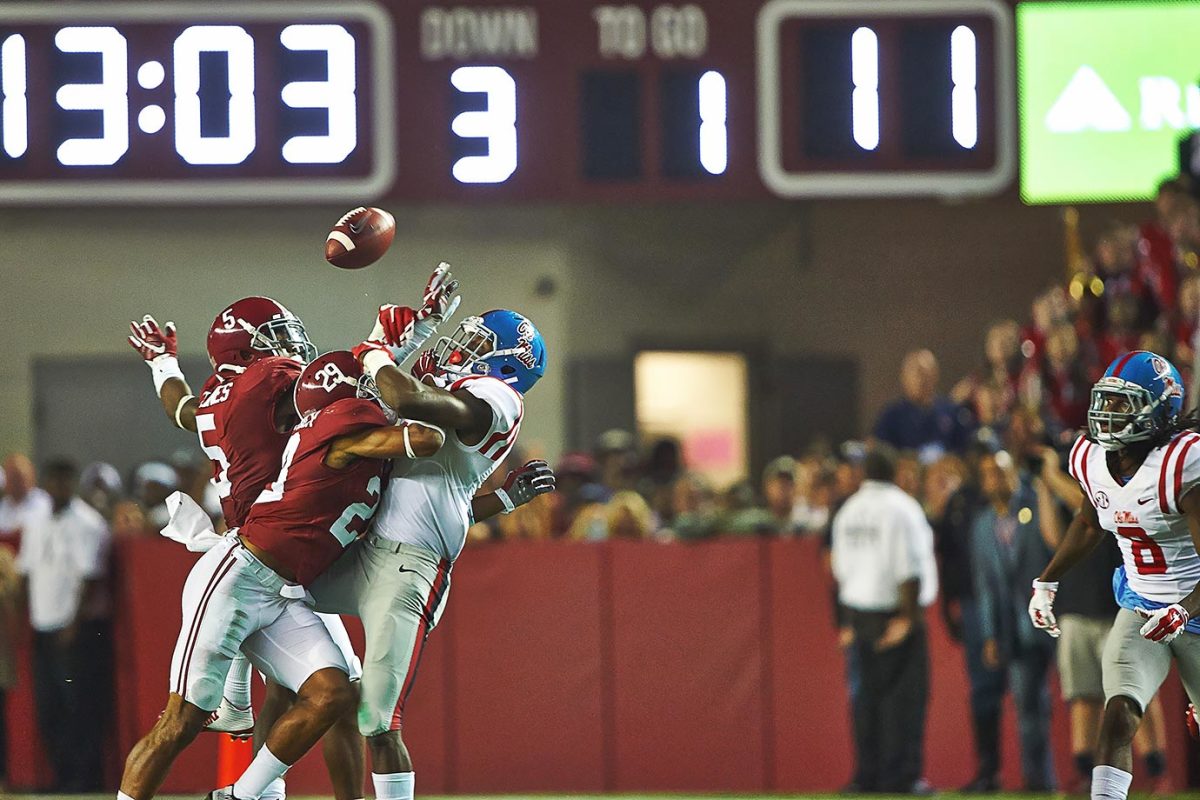
The 2015 iteration of “Let’s Get Weird,” Ole Miss-Alabama featured one of the most unlikely touchdowns of the season, one of the most vicious hits of the season and the Crimson Tide’s only loss of the season. For a moment we thought Chad Kelly would be the SEC’s breakout star and Ole Miss would be a national title contender, but then the Rebels proceeded to get blown out by Florida two weeks later.
10. Oregon 61, Arizona State 55 (3OT)
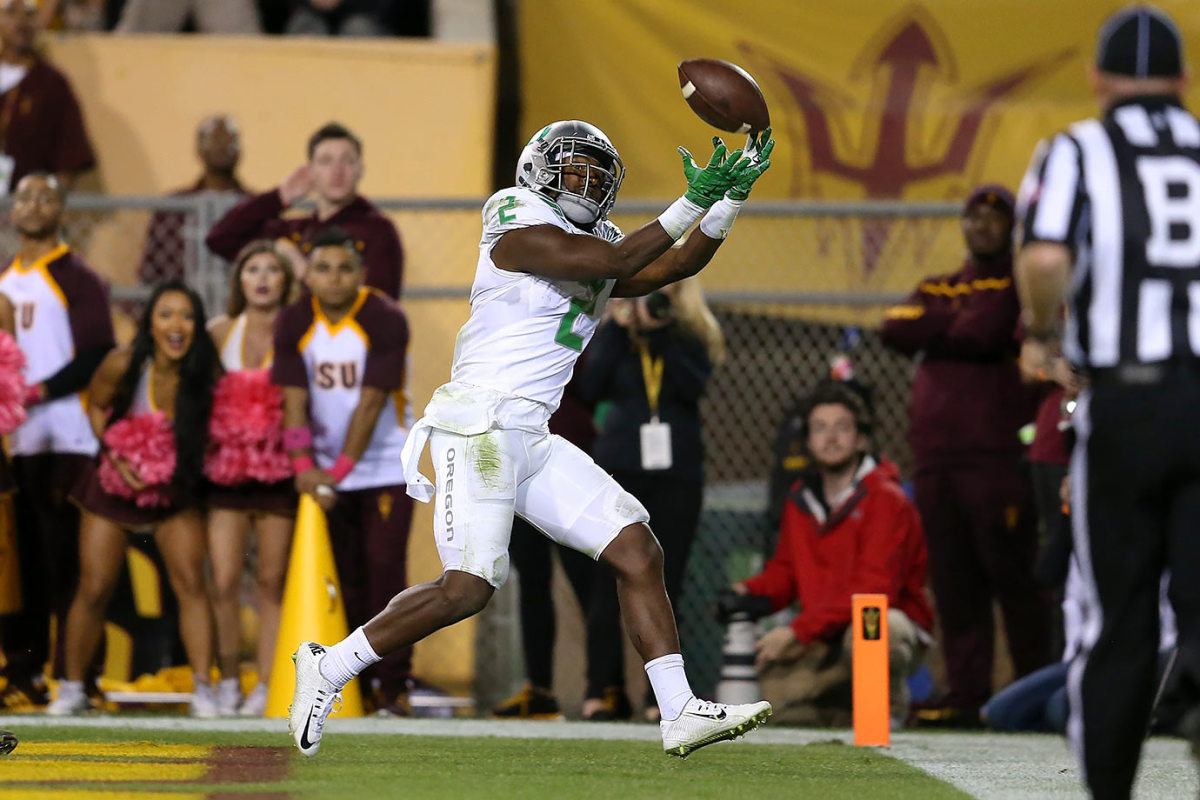
The Ducks edged Arizona State in a game in which the two teams combined for more than 1,200 yards of total offense, 15 touchdowns, three overtimes and a controversial conclusion. It’s safe to assume that anyone who elected to tune in for this Thursday night thriller was not disappointed.
11. Oklahoma 31, Tennessee 24 (2OT)
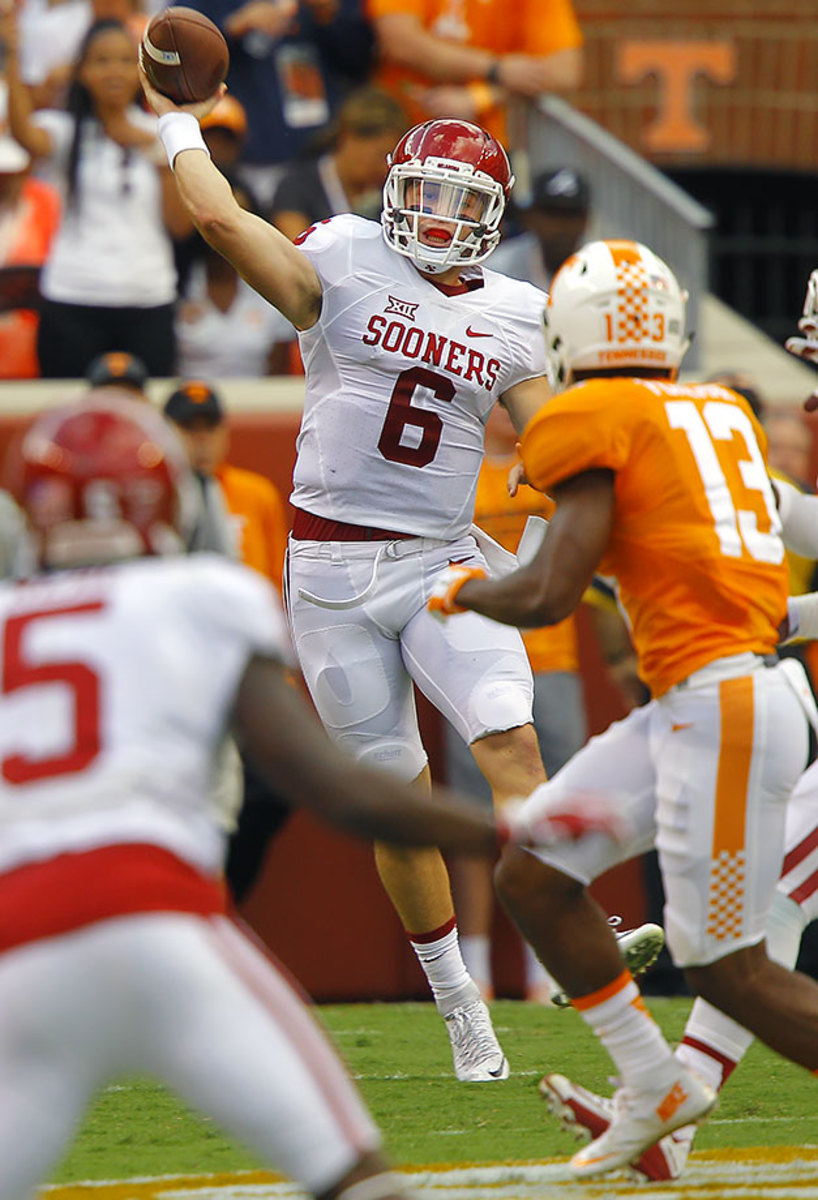
Trailing 17–3 after the third quarter, Oklahoma looked headed to a frustrating loss and more uncertainty coming off its 8–5 2014 campaign. But Baker Mayfield came alive in the fourth, leading the Sooners to a comeback, two-overtime win over the Volunteers. In retrospect it was one of the more impactful games of the season—had Oklahoma finished with two regular-season losses (but still won the Big 12), there would’ve been serious playoff controversy.
12. Houston 35, Memphis 34
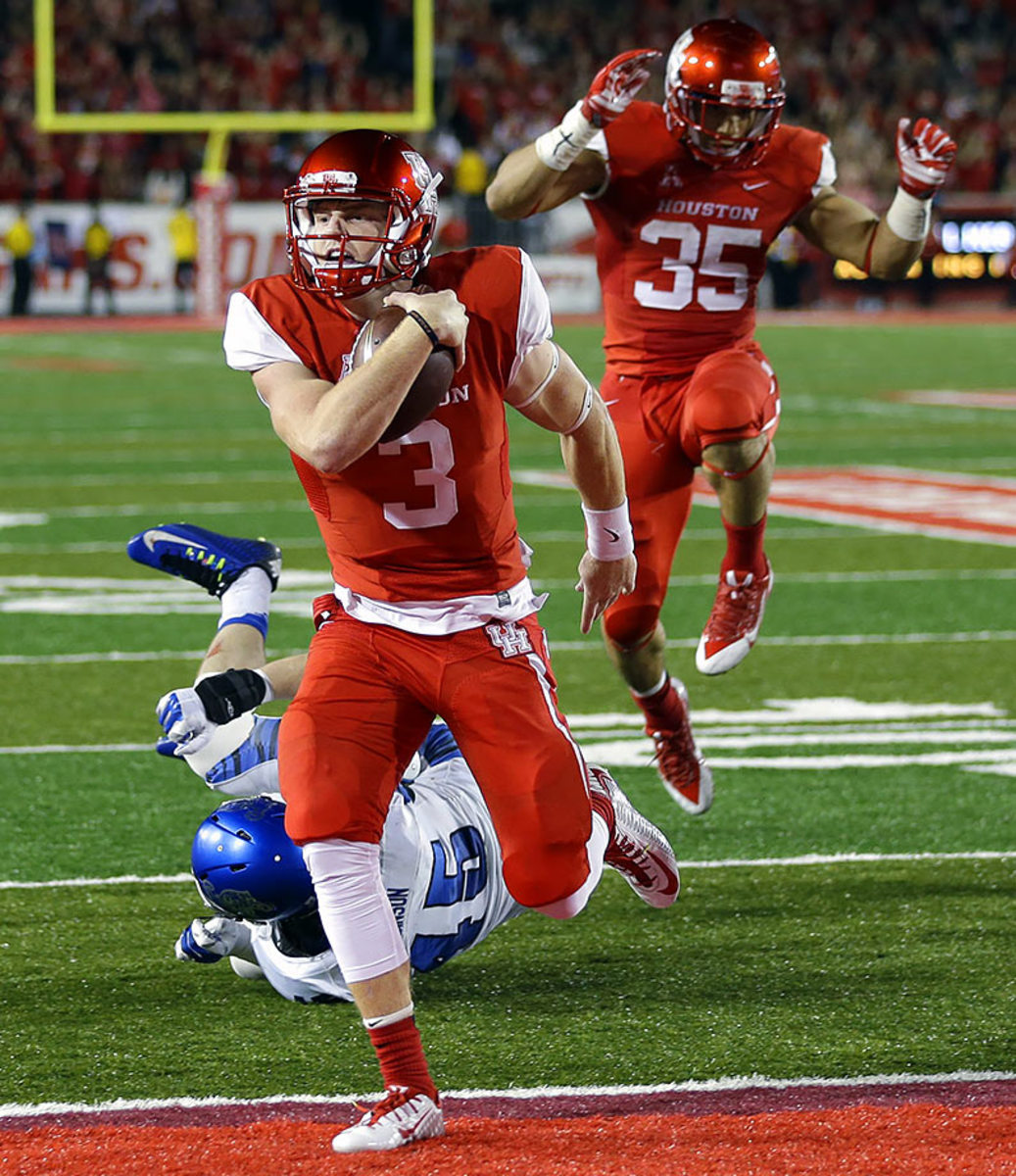
Memphis appeared to be cruising to a critical victory in its pursuit of a New Year’s Six bowl bid when the Tigers led Houston 20–0 and star Cougars quarterback Greg Ward Jr. left with an ankle injury. Memphis’s 34–14 fourth-quarter lead also appeared pretty secure. Instead wide receiver-turned-backup quarterback Kyle Postma rallied Houston for a miraculous victory, running in the winning score himself with 1:27 remaining.
13. Miami 30, Duke 27
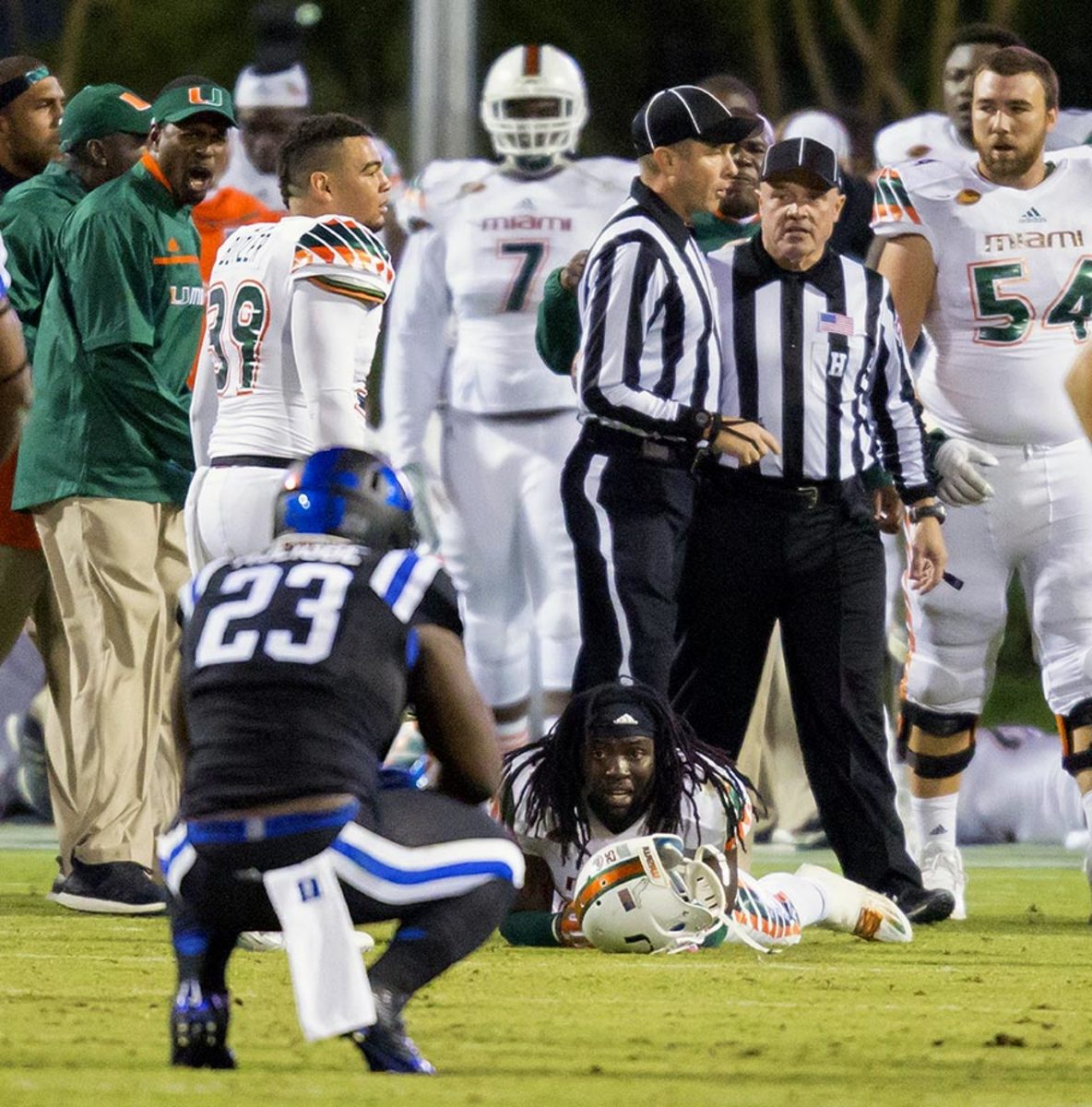
Between Duke’s seemingly game-winning touchdown, Miami’s epic eight-lateral return and the controversy over the botched officiating (not to mention the Hurricanes’ perfect Twitter response to that controversy: ¯\_(ツ)_/¯), this ending had it all.
14. Arkansas 54, Auburn 46 (4OT)
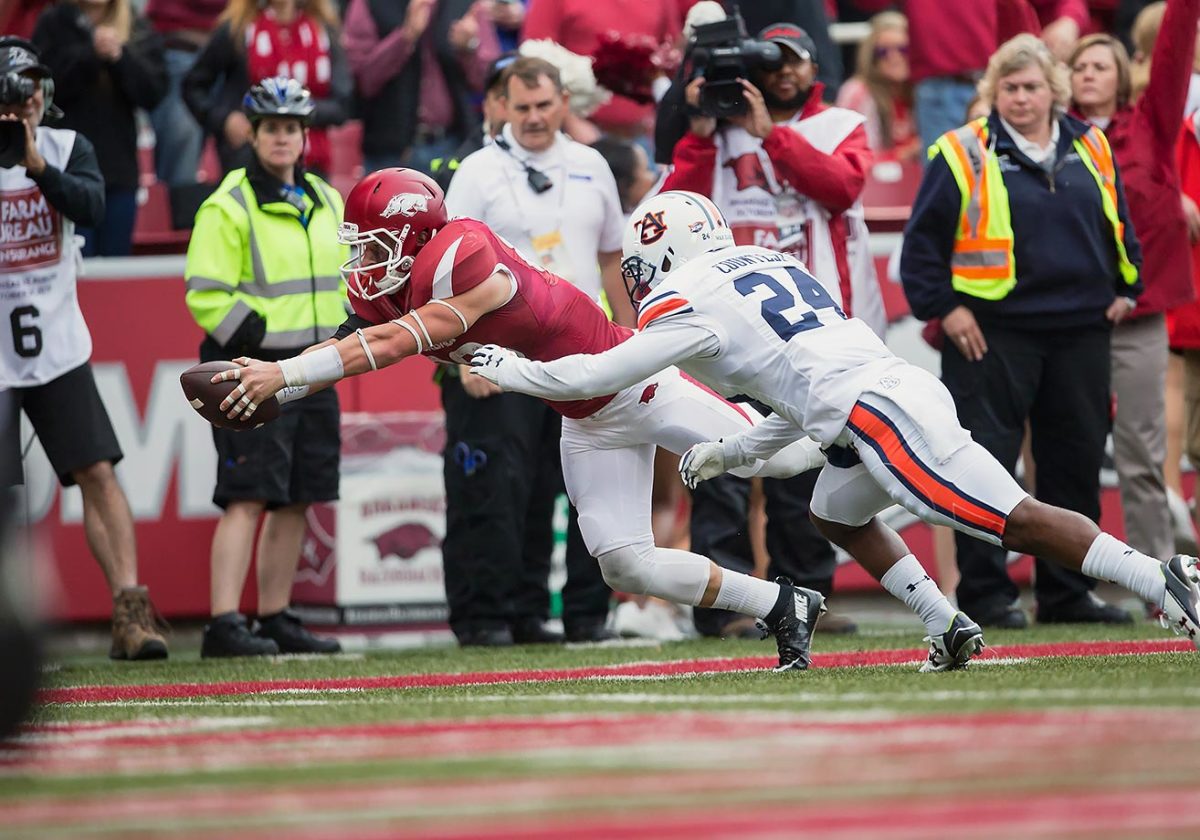
One of only two four-overtime games on this list, this contest saw these two teams go back and forth throughout regulation and the extra periods. After Brandon Allen connected with Drew Morgan to open the fourth overtime with a touchdown, the Razorbacks’ defense finally held, kicking off what became a season-saving four-game win streak for Arkansas. The Tigers’ loss was made even more agonizing by their eight dropped passes.
15. Michigan State 31, Oregon 28
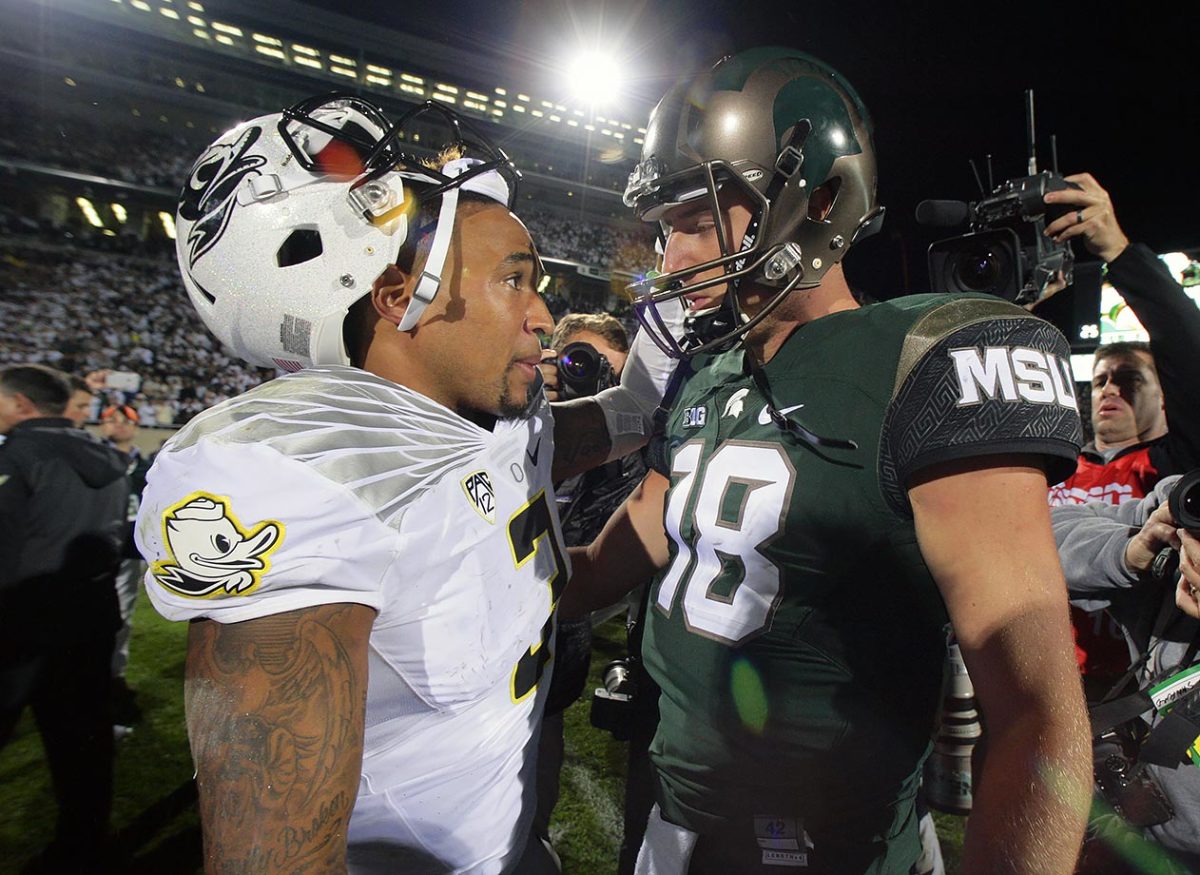
A high-profile nonconference clash brimming with College Football Playoff implications lived up to the hype, even if Oregon ultimately didn’t factor into the national championship picture. Michigan State held off the Ducks in East Lansing after Vernon Adams overthrew a receiver near the end zone late in the fourth quarter.
16. BYU 33, Nebraska 28
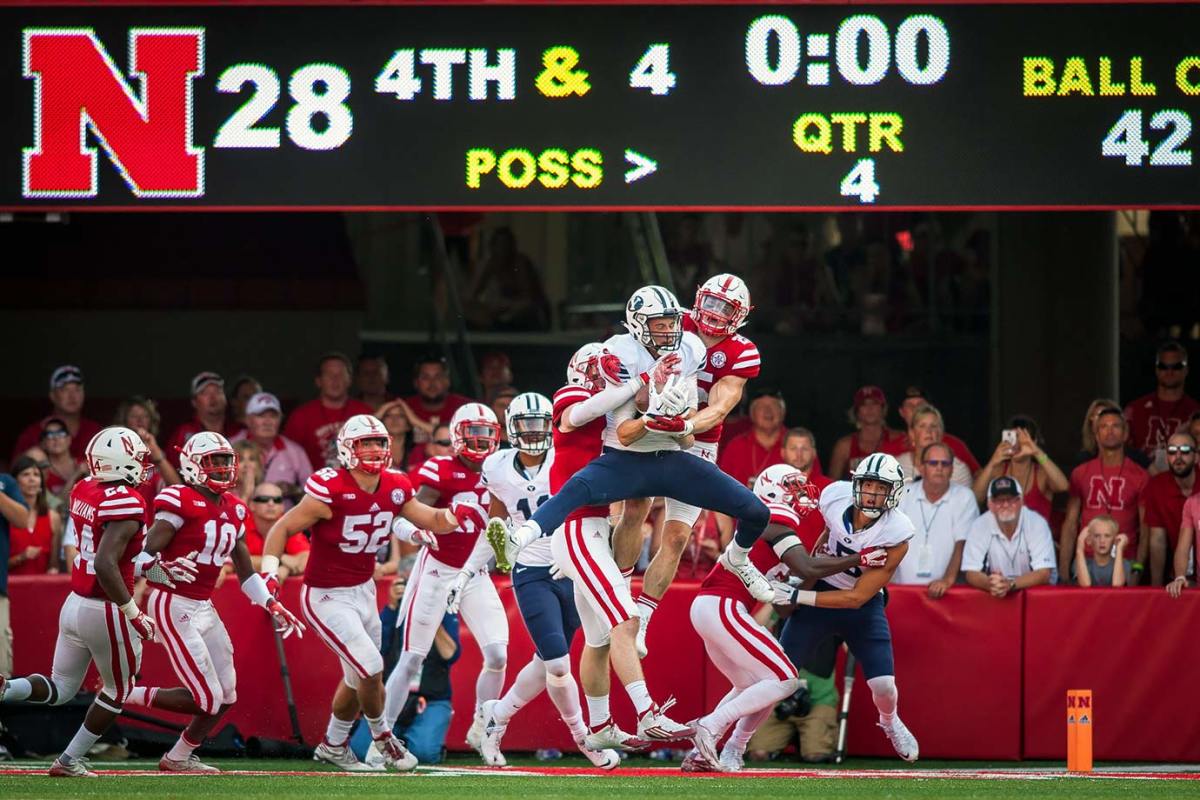
We had a few options for great BYU finishes, but we opted for the one that got it all started. The Cougars scored 17 straight points in the second quarter to take a 24–14 lead into halftime, but Nebraska responded with two third-quarter touchdowns to take the lead. Then backup quarterback Tanner Mangum, filling in for injured starter Taysom Hill, tossed a 42-yard bomb to Mitch Mathews on the final play of the game to give BYU the victory.
17. Mississippi State 51, Arkansas 50
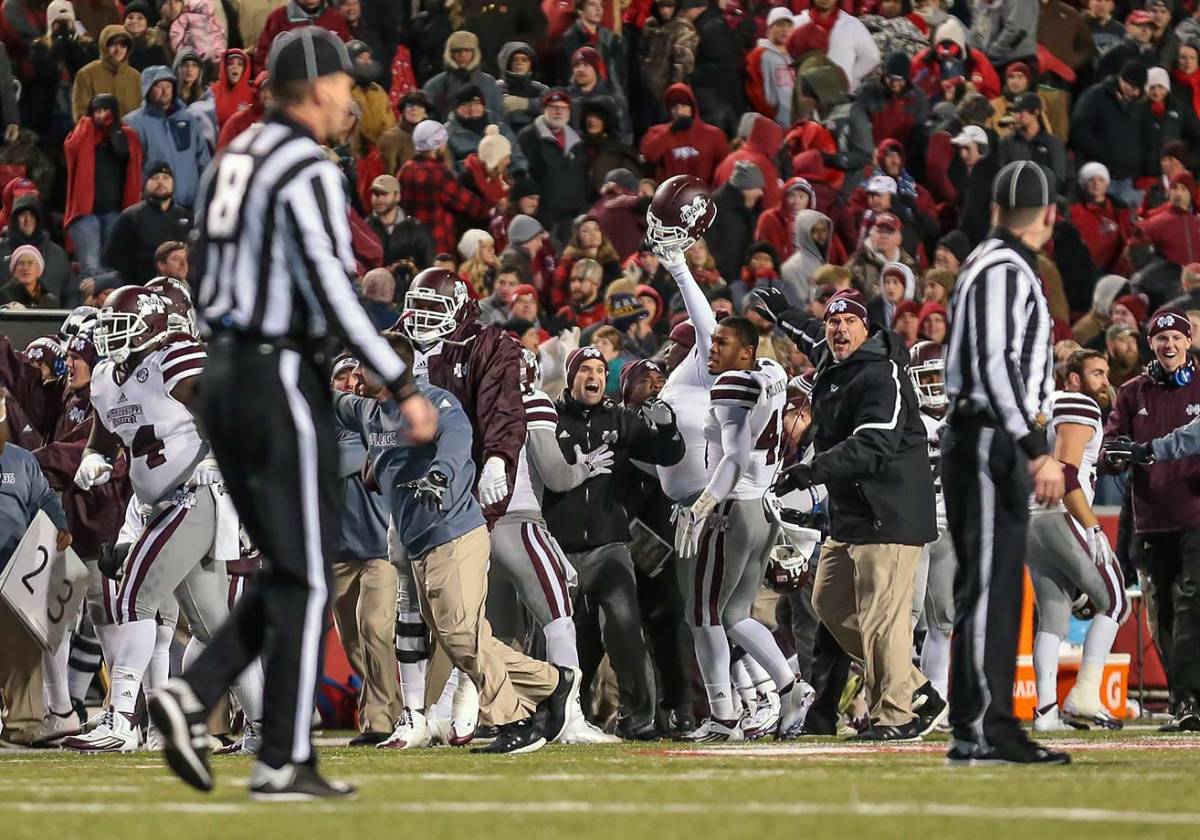
Was this an SEC game or the Big 12? The two teams combined for 101 points, 1,110 yards of total offense and 13 touchdowns in a game decided by Cole Hedlund’s blocked 29-yard field-goal attempt. With 39 seconds left, Mississippi State’s Beniquez Brown ended Arkansas’s hopes and spoiled a career night for quarterback Brandon Allen, who tied an SEC record with seven touchdown passes. The Bulldogs were buoyed by Dak Prescott’s 508 yards and five touchdowns.
18. Oklahoma State 35, Iowa State 31
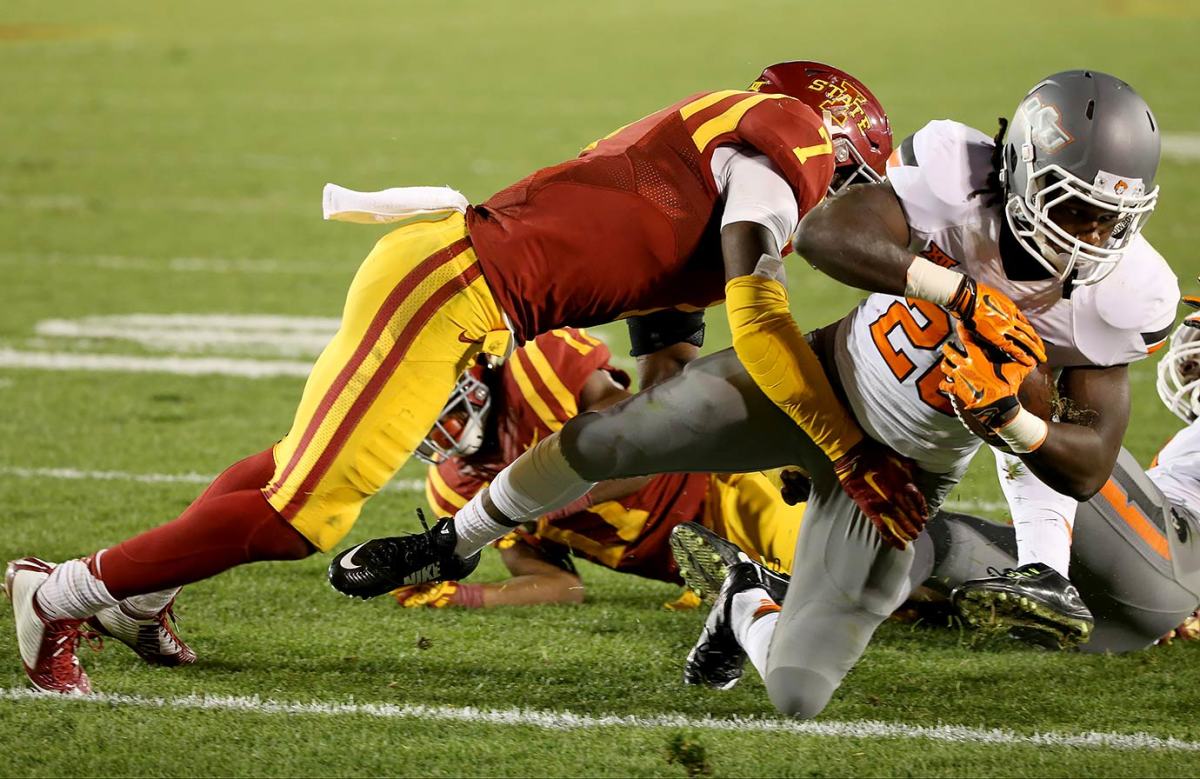
Four years after Iowa State ruined Oklahoma State’s dream season, the Cowboys nearly saw history repeat itself, trailing the lowly Cyclones by 10 entering the fourth quarter. The Cowboys were able to rally back—aided on their game-winning drive by their own false start, which wiped out a critical third-down incompletion—and avoid the upset, keeping their playoff hopes alive.
19. Duke 45, Virginia Tech 43 (4OT)
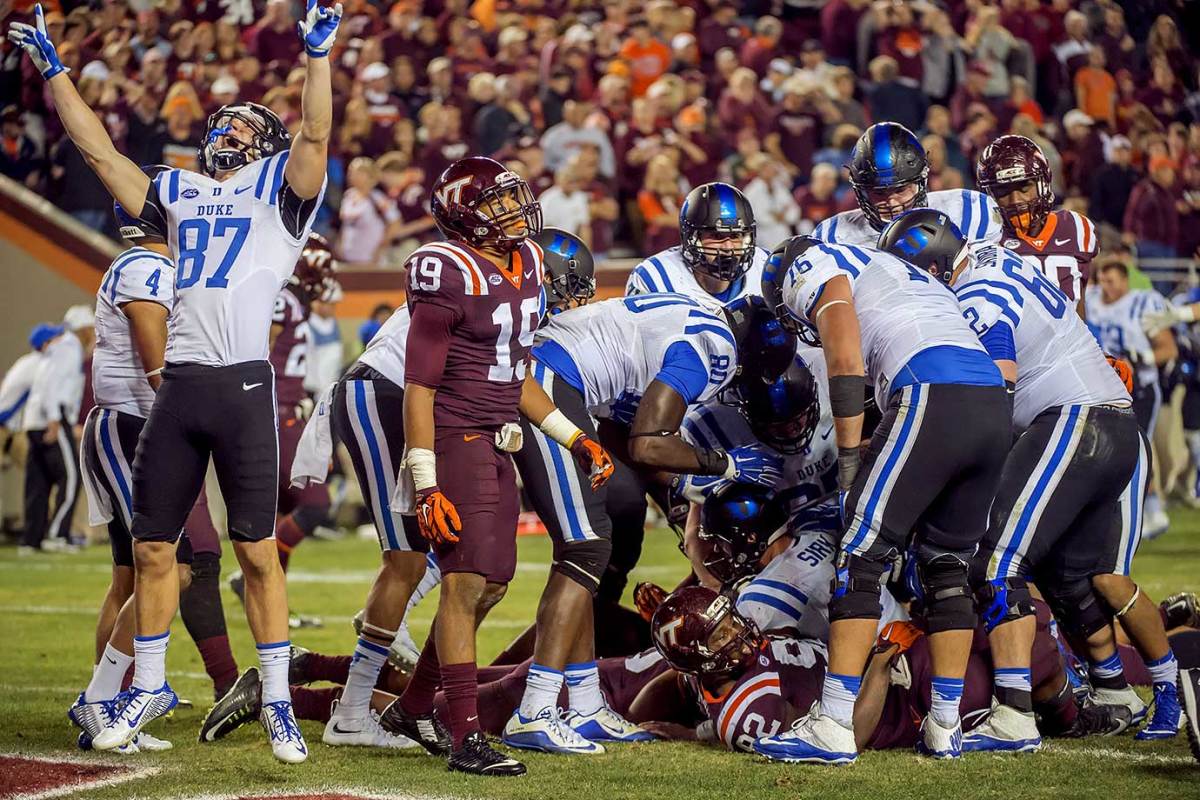
The normally defensive led Blue Devils got four touchdown passes from quarterback Thomas Sirk before he ran for the game-winning two-point conversion to defeat Virginia Tech in the longest game in ACC history. The Hokies scored the first touchdown in the fourth overtime, but with the rules mandating that teams go for 2-point conversions after two overtimes, Virginia Tech quarterback Michael Brewer attempted to sneak a pass into Isaiah Ford that was knocked away by Duke’s Deondre Singleton.
20. Oregon 38, Stanford 36
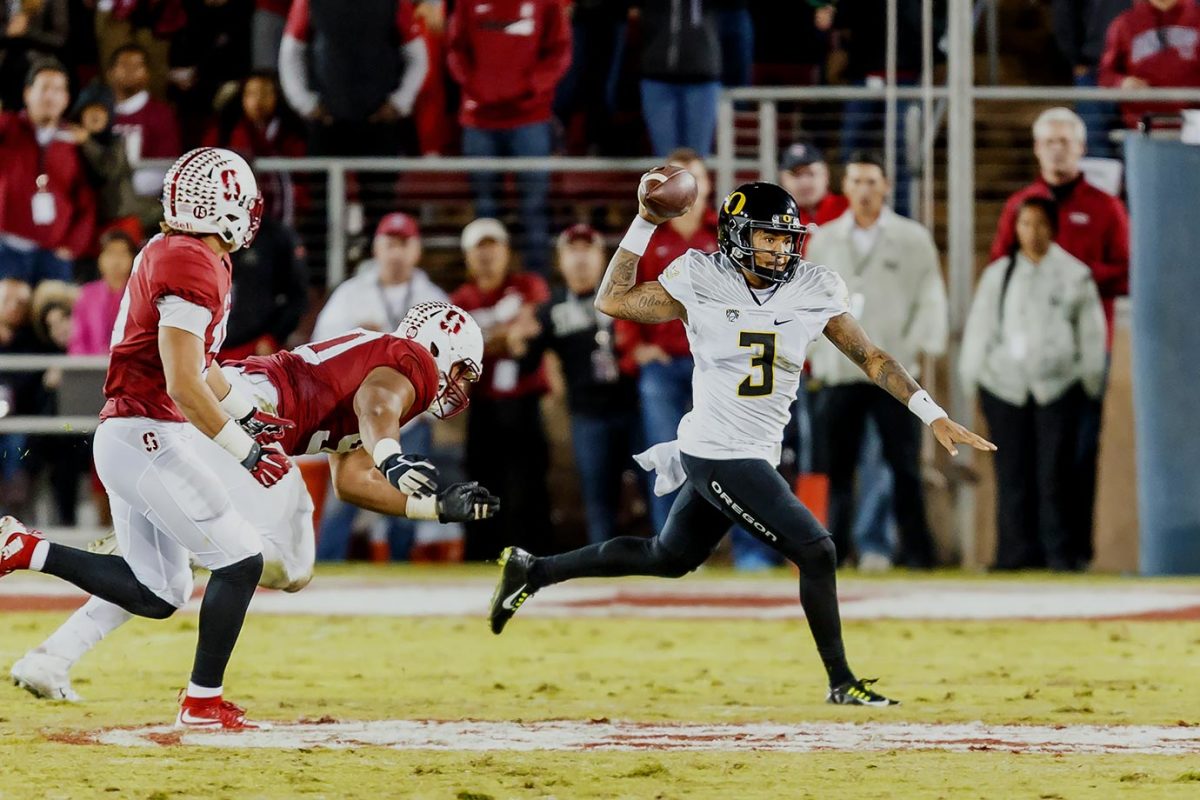
It was the game that reminded everyone why the Ducks were so excited about FCS transfer quarterback Vernon Adams and the game that kicked the Pac-12 out of the playoff. Adams completed 10 of 12 passes for 205 yards with two touchdowns, Heisman runner-up Christian McCaffrey totaled 147 rushing yards and the Ducks’ defense made a big stop on the final play of the game, stuffing the Cardinal’s two-point conversion attempt.
21. Ohio State 34, Indiana 27
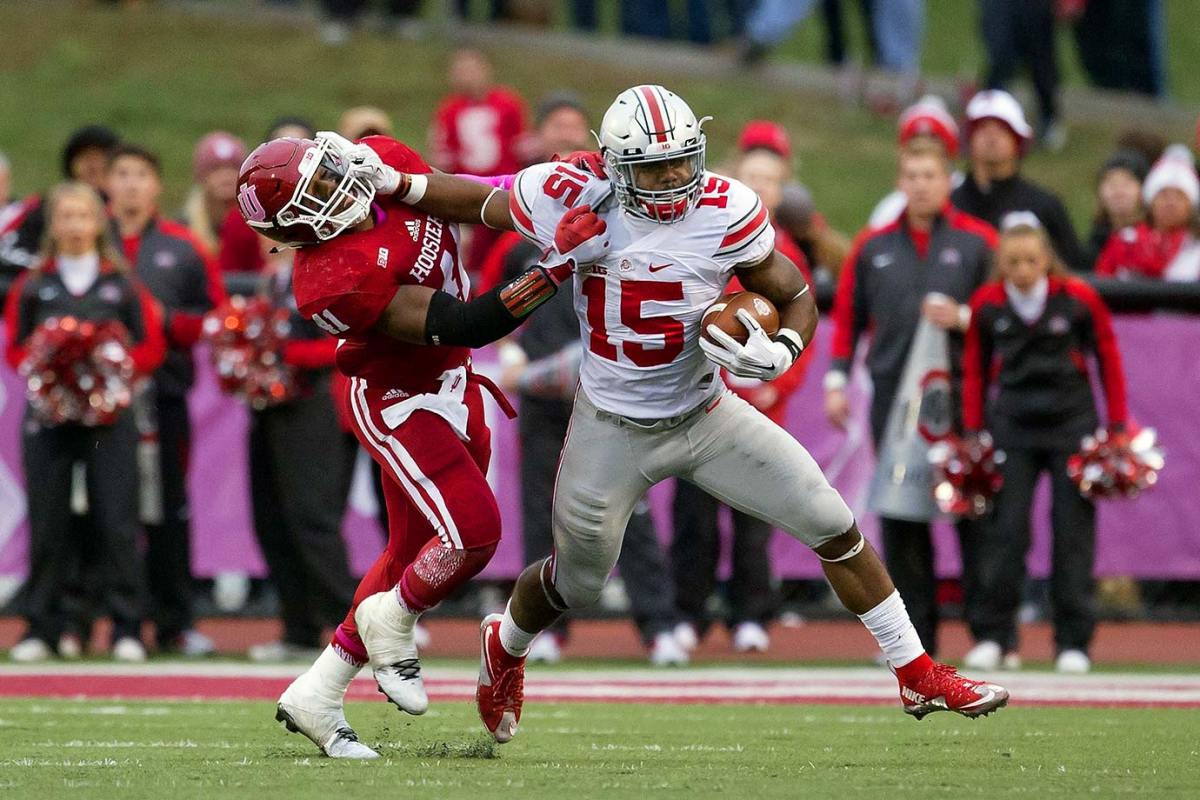
The defending national champion Buckeyes escaped Bloomington with a win thanks to a Heisman-like effort from Ezekiel Elliott, who ran 23 times for 274 yards with three touchdowns. Elliott seemingly put the game away with his third touchdown to give Ohio State a 34–20 lead in the fourth quarter, but Indiana backup quarterback Zander Diamont responded with a 79-yard touchdown run on the first play of the ensuing drive. The Hoosiers got the ball back with the chance to tie it, and Diamont drove to the Ohio State six-yard line. But his pass to the back corner of the end zone was batted away by Ohio State’s Eli Apple as time expired.
22. Oklahoma 30, TCU 29
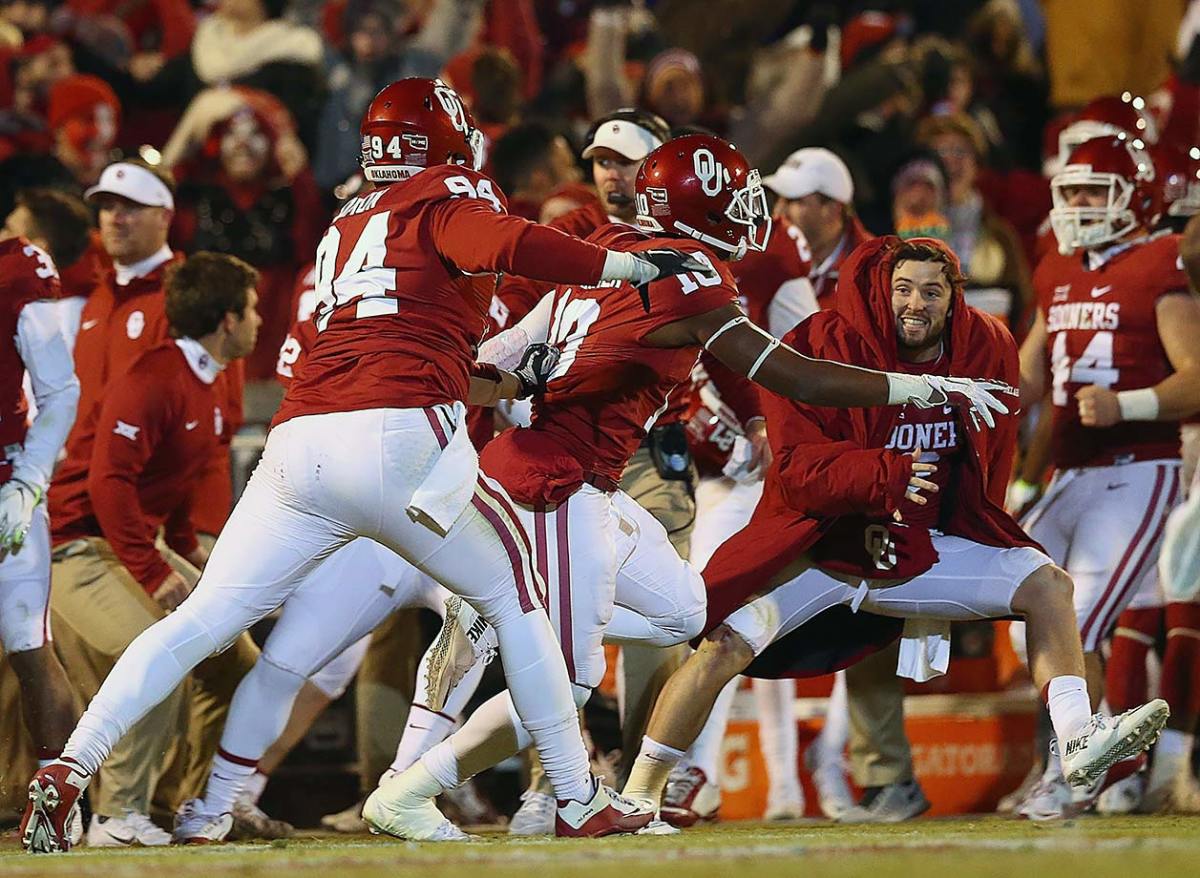
Despite playing without quarterback Trevone Boykin and wide receiver Josh Doctson, the Horned Frogs almost threw a wrench into Oklahoma’s eventually run to the College Football Playoff. Trailing 30–13, TCU backup Bram Kohlhausen led a furious fourth-quarter comeback, but by safety Steven Parker batted down Kohlhausen’s potential game-winning two-point conversion try with 51 seconds remaining.
23. Michigan State 16, Iowa 13
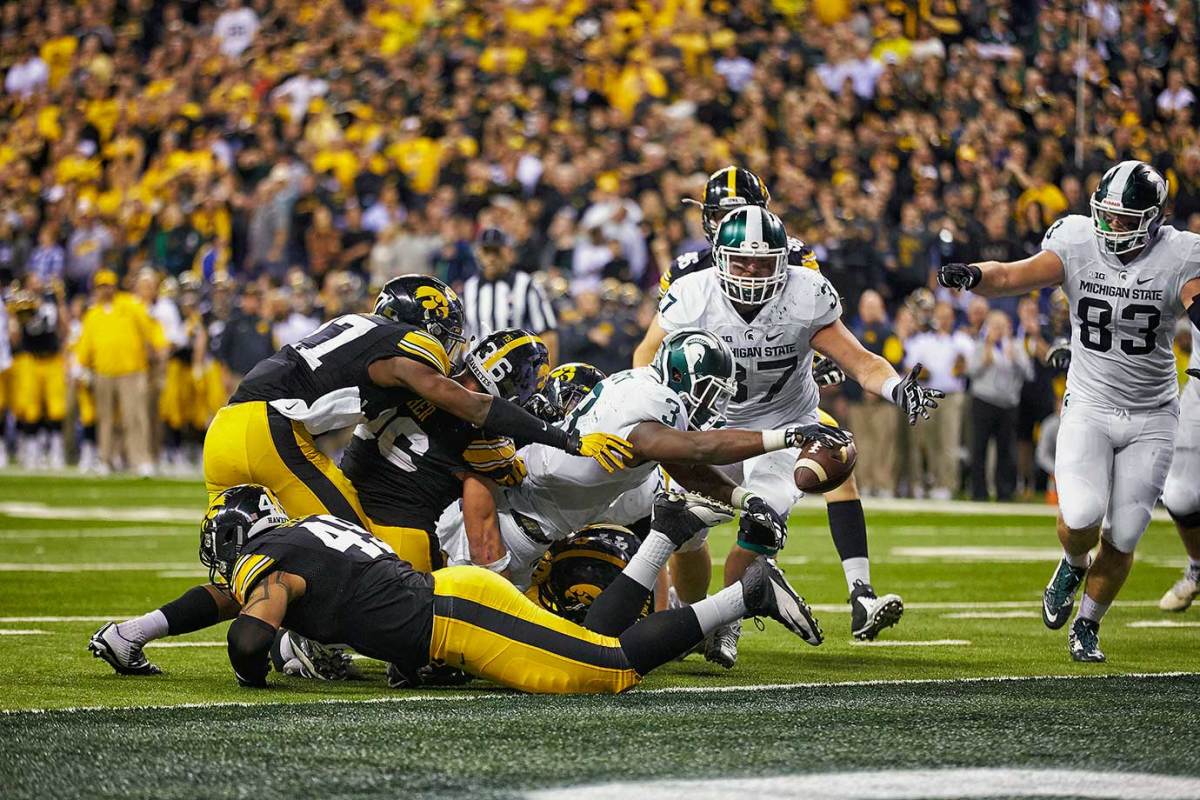
In this de facto College Football Playoff quarterfinal slugfest, Michigan State capped off its second Big Ten title in three years using a 22-play, 82-yard drive that drained nine minutes off the clock before L.J. Scott spun and reached into the end zone from a yard out with 27 seconds left.
24. Notre Dame 34, Virginia 27
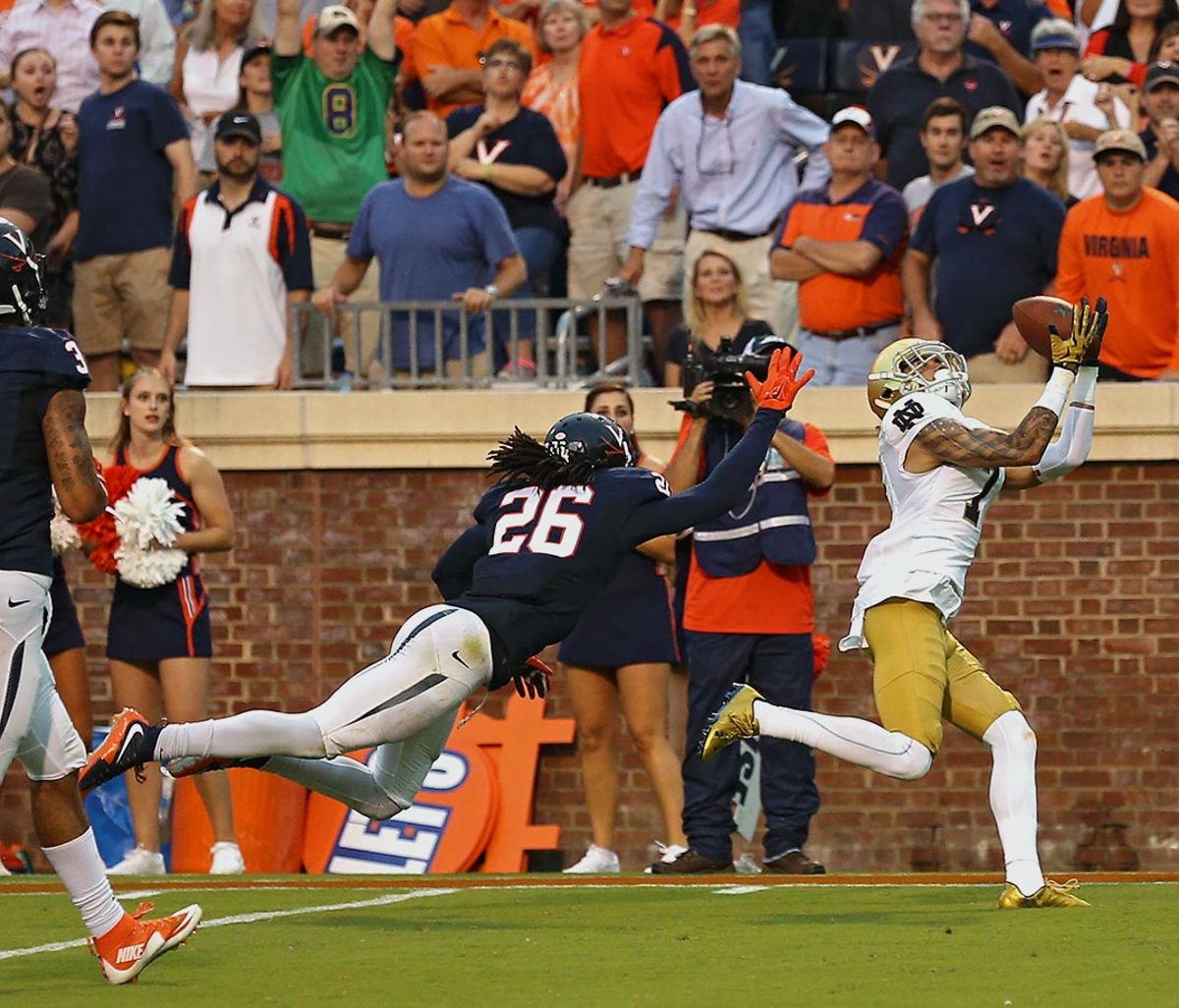
Virginia seemed poised for the monumental upset when the Cavaliers pulled ahead of Notre Dame 27–26 with just under two minutes remaining in their Week 2 matchup. But Fighting Irish backup quarterback DeShone Kizer, who stepped in after starter Malik Zaire left the game with a broken ankle, hit Will Fuller for a 39-yard touchdown pass with 12 seconds remaining to give the Irish the 34-27 win. The play left one Virginia fan particularly devastated.
25. LSU 35, Florida 28
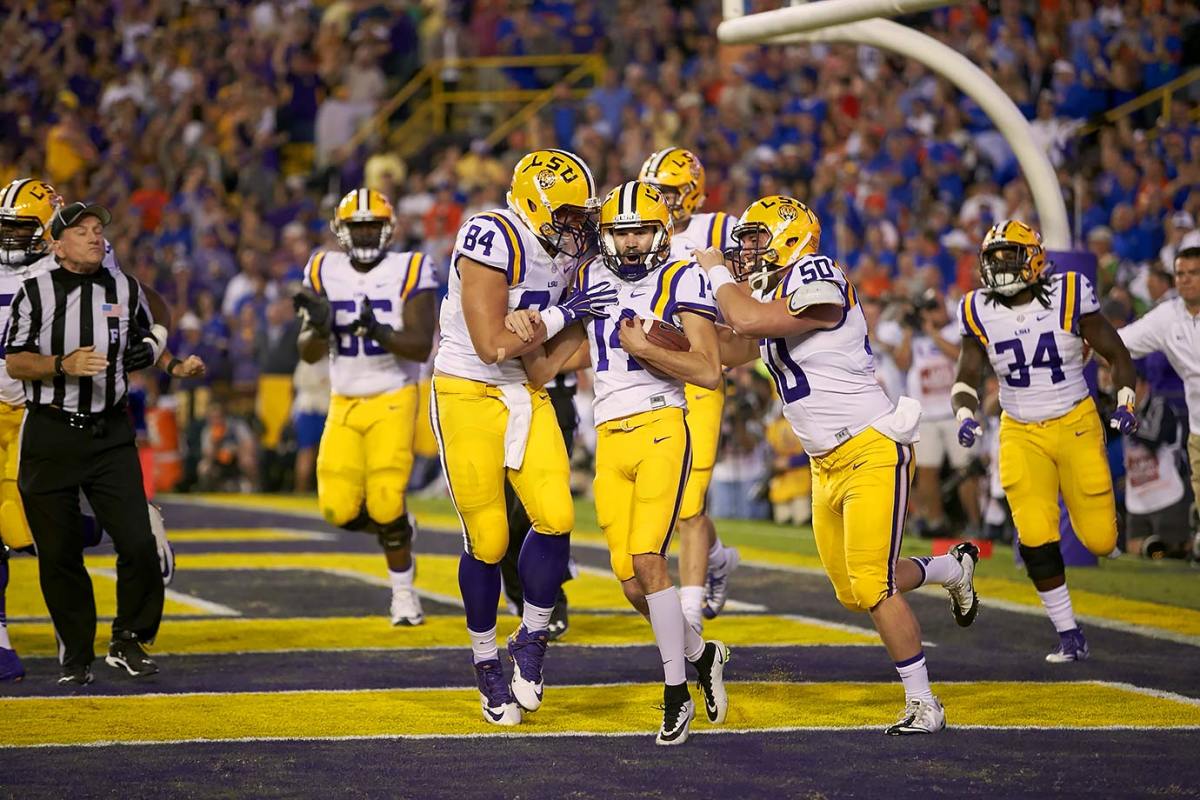
In one of the few offensive outbursts for either team (especially Florida) this season, LSU caught the Gators napping in vintage Les Miles fashion to break a 28–28 tie in the 4th quarter. Kicker Trent Domingue's 16-yard touchdown scamper on a fake field goal was the Tigers’ only score of the second half.
KH: We remain very consistent to that criteria in all of our discussions and conversations. As we’re in there ranking teams, the margins are razor-thin. When those margins are razor-thin, then the protocol that’s been established gives us an opportunity to try to rank which teams belong where. When you get into those conversations, the playoff has done a tremendous job of making sure we have all the statistical data we could every want. We have access to all the games live and game tape that we could ever want. And then obviously, as has been talked about, the criteria that’s so important when circumstances at the margin are so razor-thin are strength of schedule, head-to-head competition, comparative outcomes of common opponents—those are all things that are in our protocol and continue to drive our conversation and the analysis of the rankings.
ZE: You hired Kliff Kingsbury as Texas Tech’s football coach in 2012. What is more difficult, handling the pressure of a coaching search or picking the playoff teams?
KH:[laughs] That’s a good question. That’s the first time I’ve gotten that question. I would say this: Whether it was the hiring of Kliff Kingsbury or shortly after that we went through a basketball hire and hired Tubby Smith as our basketball coach, no two coaching searches are ever the same. I would say that’s comparable to our weekly rankings because the teams in front of us to discuss as a committee each week remain fluid. Every team either strengthens their résumé or weakens their résumé on a given Saturday. So both processes can be different from time to time.
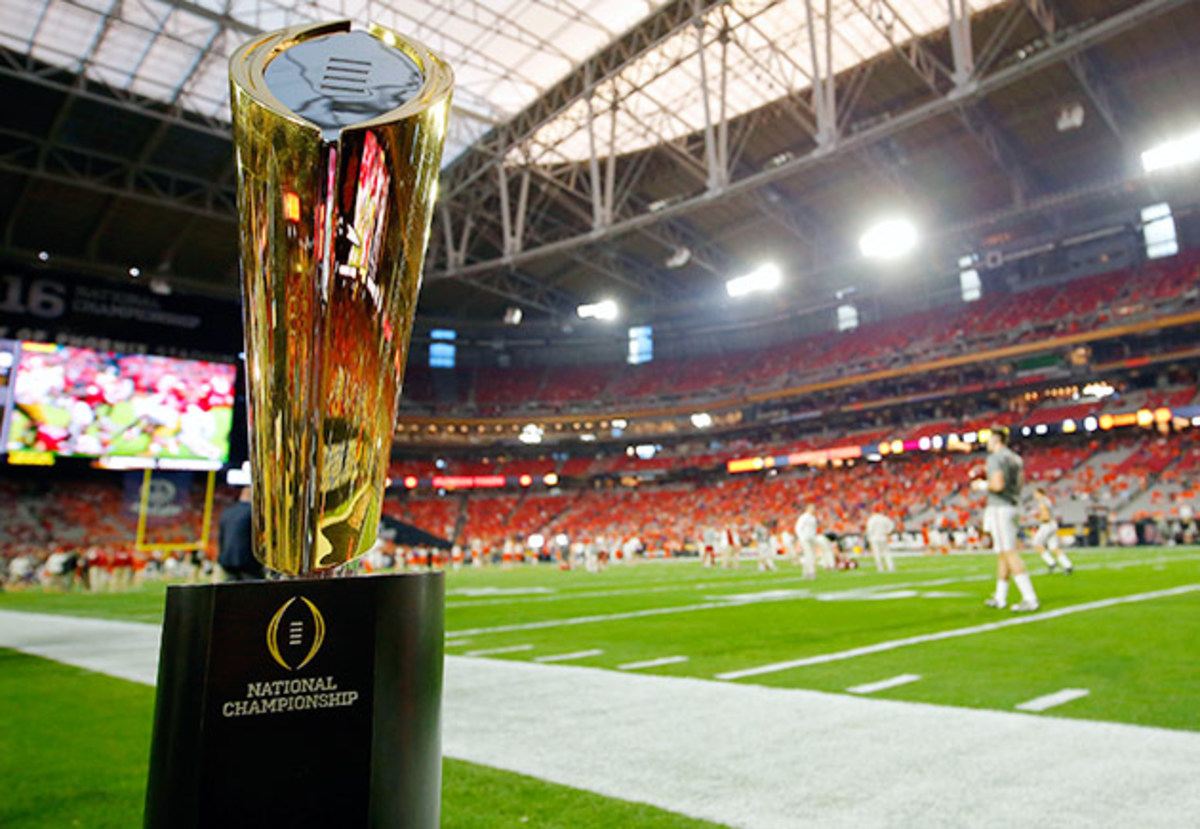
ZE: Baylor coach Art Briles once said the playoff should add more southerners to the selection committee. Now that a Big 12 athletic director sits in the chairman’s seat, has Briles reached out to you to voice his approval?
KH:[laughs] Well, I haven’t talked to coach Briles since I was selected as chairmen. Coach Briles has obviously done a tremendous job at Baylor and has had tremendous success there. So no, but he’s passionate and cares a great deal about the game of college football.
ZE: I have to ask you about the Big 12. Last week the NCAA voted to allow conferences with fewer than 12 teams to hold a championship game as long as the conference plays a round-robin schedule. Obviously, that news sparked plenty of chatter about the Big 12’s future with regards to potential expansion, a title game, etc. How would you describe the Big 12’s current stability?
2016 NFL draft declaration winners, losers: Which programs fared best?
KH: Well, I’m going to talk with my Big 12 athletic director hat on now, as opposed to committee chairmen. I believe we have great stability within our conference membership. The competiveness and strength of our league on the field, on the court, is as strong as any league out there. From top to bottom, I think we are as competitive as any league you’ll find.
I’m excited and pleased that we have the championship opportunity in front of us now. That’s an option that we previously have not had, and I know that will be an important topic of conversation as we get together as athletics directors to meet in the coming months, as well as our spring meetings in May.
We, as a league, recognize that we’re different than the four others that have been called “high visibility” leagues. We’re different in our size, we’re different in the fact that we do not have a championship game and we’re different in the fact that we don’t have a conference network. All of those things continue to be talked about and analyzed. Obviously it’s no secret that we have a conference composition committee, which is studying the current makeup and structure of the Big 12. That committee is made up of three presidents, and we’ve got to continue to have a discussion and make decisions on what is best for us and the future of the Big 12 conference. I think that’s all a timely discussion and one that there’s another piece on the table now with the championship game opportunity. So I think we’ve got to put them all on the table and collectively move forward. I’m confident that with the leadership of Bob Bowlsby, who I think is one of the best leaders in college athletics, we’ll do just that as a league together.
ZE: We’ve seen examples in which the Big 12’s lack of a championship game seemed to help [2015] and hurt [2014] its shot at a national title. Now that you’ve seen both sides of the coin, how much does that play into discussions of the Big 12’s future?
KH: I think that’s something we definitely recognize and we have to consider. We have seen both scenarios play out. We fully recognize there could be years in which not having a championship game is a disadvantage for us. We’ve got to recognize that if we ultimately decide to stay where we are as a league, that risk is there.
• SCOUT.COM: Breaking down Texas Tech's 2016 recruiting class
At the same time, I think there’s tremendous value to be had in playing the full round-robin schedule that we play in football. There’s tremendous strength that comes with that. In many ways, that builds those rivalries and those traditions that are so important, I believe, in college football. I think there’s strength with where we are right now. There certainly could be some disadvantages, and we just have to weigh both of those and decide what ultimately is best for our future moving forward.
